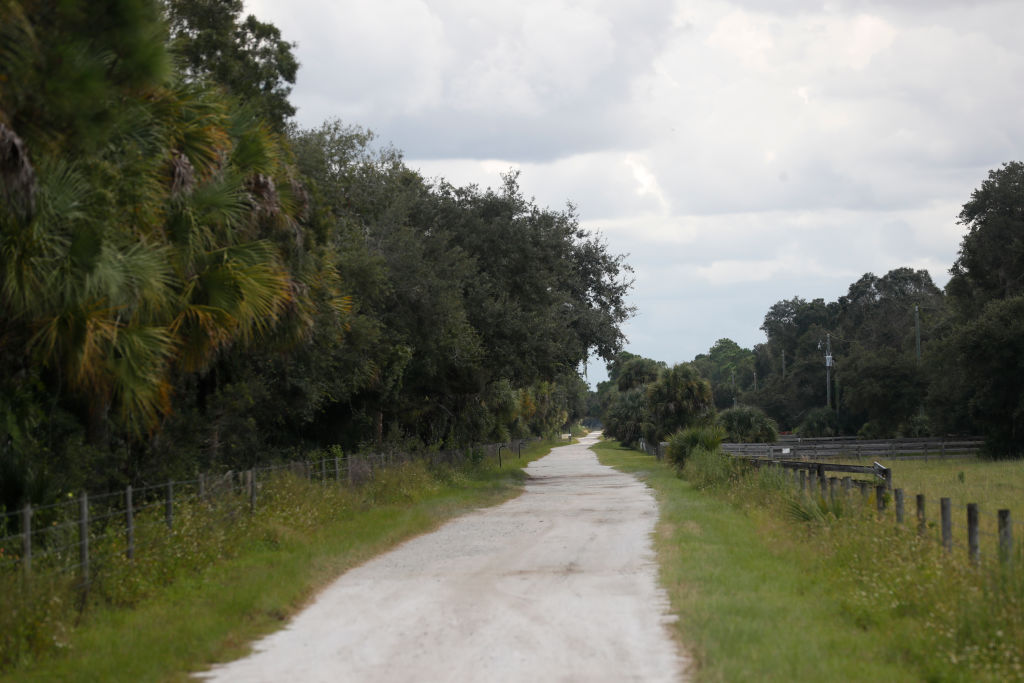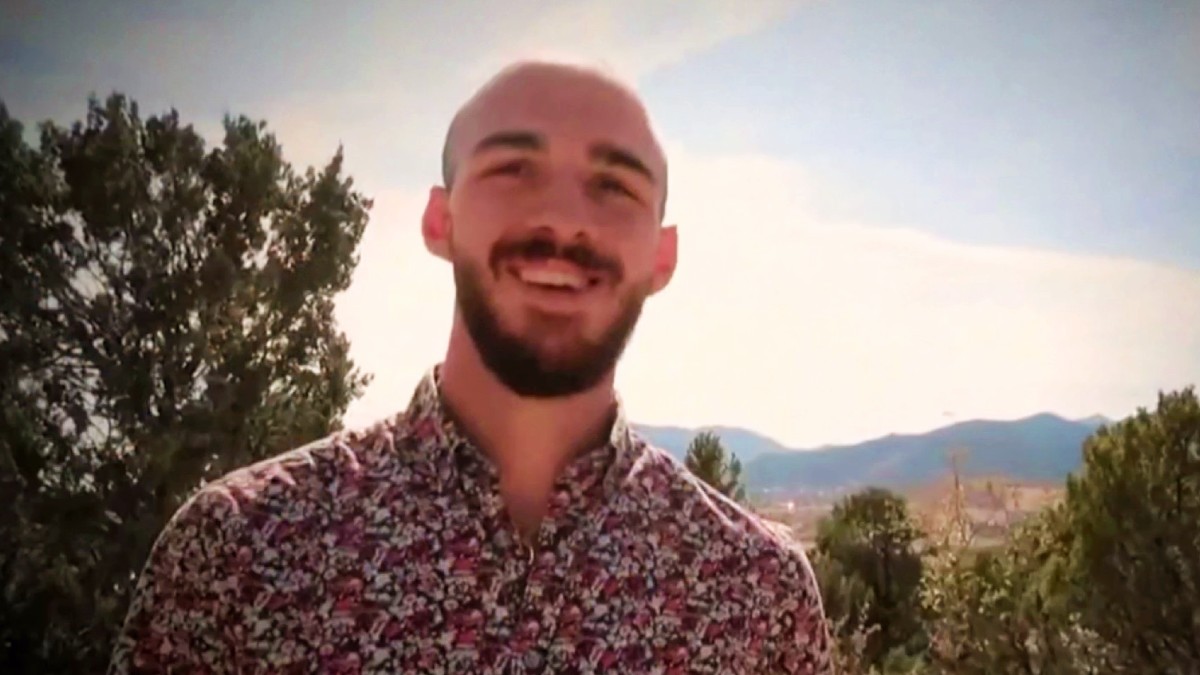What to Know
- A producer with The Vanished podcast breaks down why Gabby Petito and Brian Laundrie have garnered so much more attention than other missing persons cases
- The Vanished covers missing persons cases that in some cases might not otherwise get media exposure
- Petito's body was found in Wyoming in September; Laundrie is the only person of interest in her disappearance and is wanted by the FBI.
For more than a month now - crews have been searching either the Wyoming wilderness or the Florida swamps for Gabby Petito and Brian Laundrie.
But not every missing persons case gets drones, helicopters, cadaver dogs and FBI forensics analysts. Which begs the question: what makes the Petito case the one that gets all the resources and attention on social media?
To answer that question, investigative producer sat down with Amanda Coleman, a researcher and producer for Wondery's The Vanished podcast. They get firsthand accounts from families of missing people who don't get wall-to-wall coverage.
Get Tri-state area news and weather forecasts to your inbox. Sign up for NBC New York newsletters.
Download this week's episode of The Debrief on Apple Podcasts, Stitcher, Spotify or wherever you listen.
This transcript has been lightly edited for clarity and concision.
Pei-Sze Cheng: Have you found that your work helps the families? Does it help the investigation proceed or move along?
Hands down, it helps the families. A lot of times they can't get law enforcement to answer the phone, get a local media to cover the case or even get somebody to hang up a poster. To have someone listen to them, and let them tell their story and give them a platform is so validating to them.
To law enforcement, it's a creative tool. We have had cases in the past. One case that we covered, the death of Dona Mae Baeryl, that was also an act of intimate partner violence.
She disappeared in 1979, and we interviewed her husband. That opened up a door for police to use that interview to go and talk to him. He was sentenced to life in prison in 2019.
Wow. So that that led to a conviction as well?
Yes, it led to a conviction. She's not ever been recovered. It was a no body homicide. But the podcast was directly credited with leading them to be able to open that door, to talk to him.
Any cases that you have covered on your podcasts that are similar to Gabby's?
Absolutely, a couple of names come to mind. Savannah Spurlock and another young woman, Paige Johnson. Both of those women ultimately found deceased, and their murders were committed by males in a dating setting. They both are also white women. maybe not from the same means, maybe have different family backstories.
We also have covered many other young women. We covered Akia Eggleston. We covered Luzeia Mathis. Both of those were young women of color who were pregnant and those cases are still pending criminal action, but they're alleged murders were committed by the alleged father of the child. So we see this a lot.
One of the questions that has come up with the Gabby Petito case is, "why is it that some missing person cases draw so much attention?"
I mean, the level of attention that was put on Gabby potato's case is nothing that you remember in in recent years, right?
Actually, no. I would say that there's probably about one per year.
If you recall, back to 2018, we had Mollie Tibbetts in Iowa, we also had Jayme Kloss. Earlier this summer we had Summer Wells who of course is a very young girl. Back in 2010, we had Kyron Horman, one of the only a male child has been featured so prominently.
It does happen. There are probably one to two cases a year get this level of media attention.
And why do you think these cases attract so much attention?
I've seen the gamut and I would like to believe that it's unique circumstances or an interesting story.
If you take Gabby, she's on this adventure, she's crossing the country with her boyfriend. She's posting about it. It's easy to follow. It's engaging.
But the criminological side of that points to "missing white woman syndrome." We do see that women aged approximately 18 to 34, do get a disparate amount of attention from the media when they disappear, especially if they have a large social media presence.
But there is a huge, huge disparity. There's a gender gap. An age gap, a socioeconomic gap.
More on the Petito Case
The latest on the investigation and the hunt for Brian Laundrie
So do you think that the Petito case has fueled interest in what you do?
Well, Temporarily. Yes. We saw this back in 2018 on our podcast with Mollie Tibbetts. We've seen it with several other cases. There is a temporary flutter of attention.
I know, personally a number of my friends have reached out to me and said, "oh my gosh, I had no idea that there are so many missing people. I had no idea that this is an actual problem." To me, that's, that's a completely foreign concept, but also I'm inundated in this.
But on the negative side, I feel that it has been harmful to the work that we do in specifically targeting cases that don't get any coverage.
Imagine being a family member or with a missing daughter or a missing sister and you can't get anyone to pick up the phone. You can't get a reporter to call you back. Law enforcement doesn't want to take a report.
And then, you turn on your TV or you go to your social media and all you see is Gabby Petito, and all you see is obsession and speculation over the bumper stickers on her van and what she was wearing.
To see that is so crushing to these people. And I've had many family members ask me, "Why? Why is my loved one not worthy?
Well, what are some of the takeaways you could take from Gabby's case? Is there anything families or law enforcement could take away from this case to direct the same sort of attention for these their missing person cases?
First I'll address this as someone who was a law enforcement professional.
Law enforcement, we need to be doing better. There is no jurisdiction in the United States that has a law that puts a waiting time on reporting someone missing. Most law enforcement officers don't know that; they'll tell you "24 hours, 48 hours. They're an adult they're allowed to go missing."
There's no law that says that they're repeating what they've been told their entire career.
What about jurisdiction? Because that came up during the Gabby Petito case. Her parents called North Port police trying to file a missing persons report, and they told her they couldn't because she was last possibly in Utah or Wyoming.
So I'm actually dealing with that right now. I live in Dallas, Texas and there's a case we covered recently in Fort Worth, (the disappearance of Carolyn Riggins.) But the woman's remains were found several counties north and there has been a lot of jurisdictional pointing of fingers.
Honestly, this is what it comes down to. They can take a report. There's nothing barring them.. They could easily call the agency where the person was last seen.
The issue is, I think, lack of training. You don't learn about missing persons in the academy. It is a gray area of crime because there's no inherent crime in an adult disappearing. So in your law enforcement officer brain, you think, "I don't have any probable cause that a crime occurred, So why would I take a report?"
That's the law enforcement side of things. And I think the improvement on that is take the report. Trust what the family says, because they know the missing person. They know what's characteristic of them. And treat it like a crime until you have evidence that no crime occurred that needs it. That's a major shift we need to have in this country with missing persons.
As far as families go: know that there's no waiting period when you call or you go in and they tell you it's 24 hours. Be that person. "No, there's not. Show me where it says that I need to wait to file a missing persons report."
Trust your gut. I'm familiar with Gabby's case. Her parents felt something wasn't right when she stopped checking in. Trust your gut, make that missing persons report as soon as your gut tells you that something is wrong. The sooner you are able to get that report, the sooner agencies can figure out who's in charge of what and where the person was last seen and who needs to be doing what.
And be the squeaky wheel. Gabby's parents have been great about that. And even in that, they're saying, "we're so blessed that our daughter got all of this coverage and attention, but all missing persons deserve that." And I thank them for recognizing that fact.
Right. So you think the speed at which they found Gabby, there are lessons to be learned? Could this improve the process for other missing persons cases down the road?
Something that I can tell you from firsthand experience, law enforcement agencies are always short on resources. We're always short-staffed but that's life in law enforcement.
It's very difficult to watch millions and millions of dollars being spent looking for Gabby's boyfriend. There's no indication that he was a danger to the community. His alleged offense was very specific to his partner. He wasn't on a killing spree that we know of.
And yet all of the sudden these agencies, some of whom have told me personally, "we don't have those resources or we don't have the money, or we don't have the staff" are all of the sudden all-hands-on-deck. Helicopters, drones, the whole nine yards.
We're deploying all of these resources. For what reason? He's a fugitive. We have lots of fugitives in this country. You issue a warrant and you give him the same attention that you would give anyone who is charged with a crime.
So you're saying the same thing that happened for Gabby is happening for Brian?
Part of our mission statement on The Vanished is that "every human being is worth being found and worth being brought home." Well, that includes Brian because he's still missing.
But the resources devoted to Gabby and to him, they should be evenly distributed.
Thank you so much, Amanda.
Thank you.




